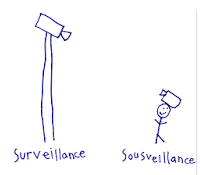sousveillance
Sousveillance (/suːˈveɪləns/ soo-VAY-lənss) is the recording of an activity by a participant in the activity, typically by way of small wearable or portable personal technologies. wikipedia
keyloggers are legal and free, here is a list of the top 10 out there
microsoft has a built-in tool that collects all your text written > techspot coverage, and here
seems to be gone as of 09/2019
Your own file can be found at: C:\Users\%user%\AppData\Local\Microsoft\InputPersonalization\TextHarvester
text from paper
The Visible Man: An FBI Target Puts His Whole Life Online
Clive Thompson Email 05.22.07
Hasan Elahi whips out his Samsung Pocket PC phone and shows me how he's keeping himself out of Guantanamo. He swivels the camera lens around and snaps a picture of the Manhattan Starbucks where we're drinking coffee. Then he squints and pecks at the phone's touchscreen. “OK! It's uploading now,” says the cheery, 35-year-old artist and Rutgers professor, whose bleached-blond hair complements his fluorescent-green pants. “It'll go public in a few seconds.” Sure enough, a moment later the shot appears on the front page of his Web site, TrackingTransience.net.
There are already tons of pictures there. Elahi will post about a hundred today — the rooms he sat in, the food he ate, the coffees he ordered. Poke around his site and you'll find more than 20,000 images stretching back three years. Elahi has documented nearly every waking hour of his life during that time. He posts copies of every debit card transaction, so you can see what he bought, where, and when. A GPS device in his pocket reports his real-time physical location on a map.
Elahi's site is the perfect alibi. Or an audacious art project. Or both. The Bangladeshi-born American says the US government mistakenly listed him on its terrorist watch list — and once you're on, it's hard to get off. To convince the Feds of his innocence, Elahi has made his life an open book. Whenever they want, officials can go to his site and see where he is and what he's doing. Indeed, his server logs show hits from the Pentagon, the Secretary of Defense, and the Executive Office of the President, among others.
The globe-hopping prof says his overexposed life began in 2002, when he stepped off a flight from the Netherlands and was detained at the Detroit airport. He says FBI agents later told him they'd been tipped off that he was hoarding explosives in a Florida storage unit; subsequent lie detector tests convinced them he wasn't their man. But with his frequent travel — Elahi logs more than 70,000 air miles a year exhibiting his art work and attending conferences — he figured it was only a matter of time before he got hauled in again. He might even be shipped off to Gitmo before anyone realized their mistake. The FBI agents had given him their phone number, so he decided to call before each trip; that way, they could alert the field offices. He hasn't been detained since.
So it dawned on him: If being candid about his flights could clear his name, why not be open about everything? “I've discovered that the best way to protect your privacy is to give it away,” he says, grinning as he sips his venti Black Eye. Elahi relishes upending the received wisdom about surveillance. The government monitors your movements, but it gets things wrong. You can monitor yourself much more accurately. Plus, no ambitious agent is going to score a big intelligence triumph by snooping into your movements when there's a Web page broadcasting the Big Mac you ate four minutes ago in Boise, Idaho. “It's economics,” he says. “I flood the market.”
Elahi says his students get it immediately. They've grown up spilling their guts online — posting Flickr photo sets and confessing secrets on MySpace. He figures the day is coming when so many people shove so much personal data online that it will put Big Brother out of business.
For now, though, Big Brother is still on the case. At least according to Elahi's server logs. “It's really weird watching the government watch me,” he says. But it sure beats Guantanamo.
